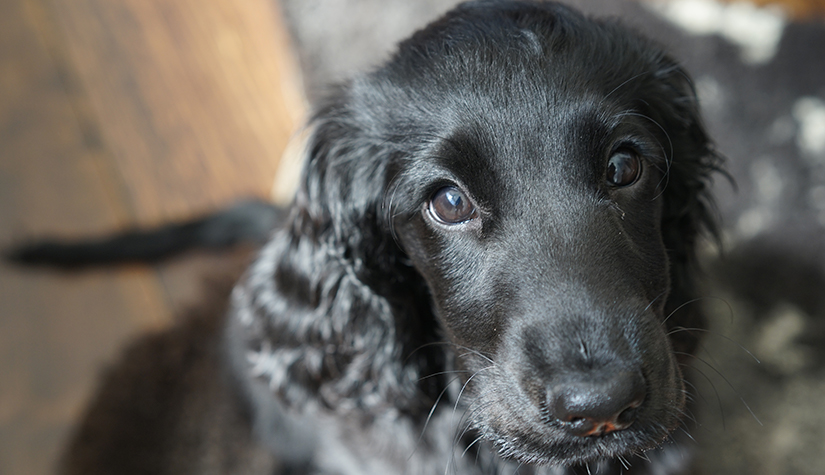Have you ever had a puppy or are you thinking of adding a puppy to your family soon – maybe even this Christmas*? Living with a puppy can be loads of fun but at times even the most patient person might feel more than a little exhausted. But it is not the exuberant and impulsive puppy behaviour that we should be most concerned with. The biggest responsibility of raising a puppy is not to teach them “manners”, it is to ensure they have a bright future. And that future lies in your hands.
“Those first three months of your puppy’s life are just too important to be casual about.”
Guiding the young of any species through their most vulnerable time in life is always a bit daunting. So many things can go wrong. If you’ve never even thought about it, start before you venture down the path of getting a puppy or a kitten or any other young life that needs your care. Their total dependence on you gives you total power over them. And that is an enormous responsibility.
Your new puppy will have the first culture shock when they arrive at your home. Having been removed from their mother and siblings, now they are placed in a foreign place, expected to understand very different rules and forced to spend much time by themselves.
Up until then your puppy had never been alone. So what if you intend to leave your new puppy for eight to ten hours a day because of your work? What if you don’t want them in the bedroom and they have to sleep alone, maybe even outdoors?
Then there are all those normal puppy behaviours, like jumping and biting, that you try so hard to erase. For the last few weeks your puppy has been happily romping around with his mates. Now those playful behaviours are suddenly met with hostility? How will your puppy cope?
Trying to see life from your puppy’s perspective – as difficult as this is, being human – is a good first step to prevent any major traumas. Understanding what your dog’s emotional and physical needs are is even better. Those first three months of your puppy’s life are just too important to be casual about. Yes, your dog may grow up regardless and – if they are lucky – somehow muddle through life no matter what you do. They are an extremely adaptable species after all. But would it be better to give them the best start possible? You bet.
“We have adapted to living with anxious pets. They are everywhere.”
If our dogs’ poor upbringing resulted in more dog attacks than is currently the case, we would already have regulations around puppy socialisation, handling and training. But the fallout of our failings is hidden away behind the bars of countless animal shelters and the exorbitant number of young lives lost due to premature euthanasia. And that is not to say that the rest of them are happy and well-adapted dogs living in loving homes. Dogs largely suffer in silence. You rarely hear them complain. Their lives may be dull, riddled with anxiety or even barely livable, yet most of them just carry on. Why don’t we see their plight?
I believe the reason for our collective blindness to the prevalence of fear, stress and anxiety in dogs – as well as cats and other animals – is desensitisation. It starts in early childhood where we learn that it is ok to manhandle animals and make them do what we want. We either never learned what fear, stress and anxiety in animals looks like or it has been “normalised” in our minds. We have adapted to living with anxious pets. They are everywhere. Animals are being restrained and manhandled for grooming and veterinary procedures, pushed, shoved, strangled, hurt and yelled at in the name of training and left in solitary confinement day after day, year after year. If all this fear and anxiety in our pets would burst into aggression on a massive scale, we would have long learned to pay more attention.
“You have the power to make your dog happy.”
You – as a new puppy parent – can make sure your dog does not become one of the silent sufferers. You can prevent the mental and emotional distress that may one day prompt your dog to become aggressive. You have the power to make your dog happy. And the welcome side effect for you is a much decreased risk of behaviour problems and a more enjoyable life with your dog.
Being physically manipulated is one of the major sources of anxiety in our pets but something we can easily prevent or change. Dogs, and other animals, can learn to voluntarily cooperate with whatever needs to be done for their health and safety. They can be taught to enjoy all the groping and smooching we bestow on them.
You also have the power to prevent fear of strangers, children, noises, novel objects and situations in your dog – all potential sources of anxiety – by understanding what socialisation is really about and by doing the best job you possibly can.
So, here are some guidelines for the first twelve to fourteen weeks of your dog’s life to get you on the right track. You can print a PDF version to put on your fridge!
COMPANIONSHIP
- Let the puppy sleep near you during the first few days and slowly wean them towards their own bed and ultimate sleeping location.
- Keep your puppy company, especially during the first few weeks. If you work long hours, get someone else to help out. Gradually get your dog used to spending time alone.
- Spend quality time with your puppy daily. Play with your dog using toys so they can chase, grab and tug.
- Invite people to your house. Take your puppy to work or social activities (take a crate so the puppy can rest undisturbed at times).
HOUSE TRAINING
- Invest the time to properly house train your puppy. Supervise, confine and reward. Never punish a puppy for eliminating where they shouldn’t!
SOCIALISATION
- Take your puppy out into the world from the get go. If your dog only had their first vaccination, carry them on your arms or let them watch from the car.
- The importance of socialisation cannot be overstated. Create positive associations with lots of lots of sounds, sights, people, other animals – anything your dog could possibly encounter in their lives.
- Prevent fear of strangers by introducing a large variety of humans in a positive manner including children. Let the stranger give your dog treats, but be careful the puppy does not get overwhelmed. Do not allow people to simply walk up and handle your puppy. Always watch your pup for signs of stress and back up if necessary.
- The primary time for you to socialise your dog is from the moment you get them to about twelve weeks of age. Everything your dog experiences during that time will have an especially deep and lasting impact. Make sure the experiences are positive. Do not waste a day! After that continue socialising your dog to maintain their skills and well-being.
- Attend a well-run puppy preschool which includes off leash play.
- If your puppy is shy, never force them! Allow them to explore the world at their own pace.
BODY HANDLING
- Teach your dog to enjoy being touched, held, squeezed, poked etc. by starting with brief handling and gradually work up to more invasive handling. Always give a tasty treat after handling. The higher the value of your treats, the more the dog will enjoy being handled.
- Allow strangers, including children, to touch your dog but supervise closely to make sure your dog enjoys it. Always follow the handling with treats.
- Take your dog to the vet outside appointment times and give them treats in the waiting area, exam room and on the exam table. Perform mock vet exams to make them comfortable with various types of procedures.
TRAINING
- Attend a well run puppy school which uses positive reinforcement training.
- Socialisation is the most important thing at this stage whereas training can be done at any time. Focus on three or four behaviours such as sit and drop/down, stay or wait and ‘leave it’ and do lots of repetitions in different places.
- Use rewards to train your puppy. Do not use coercive methods such as physical manipulation or raising your voice. Redirect unwanted behaviour towards alternative behaviours, e.g. ask the dog to sit or go fetch a toy in situations where they are likely to jump up.
LINKS
*A puppy is for life, not just for Christmas, so consider carefully if your family is ready for a dog. If you intend to get a puppy for your kids, remember that kids quickly lose interest in new things and you are the one to be left looking after the dog for the next 10 – 15 years. Only get a dog if you really want a dog in your life!
AVSAB Puppy Socialization Statement
RSPCA Puppy Info
PPG Puppy Socialization Info
Crosspaws Puppy Guide
Crosspaws House Training Guide
 Copyright secured by Digiprove © 2016 Sylvie Martin
Copyright secured by Digiprove © 2016 Sylvie Martin 

Very helpful information. We plan to have a puppy as we can now be home and good companion to a little one. We often care for our children’s dog and have a avoided getting one of our own till we were sure we could be able to provide the dog a good loving home. Already starting to study and look in to a training program for my husband and me.